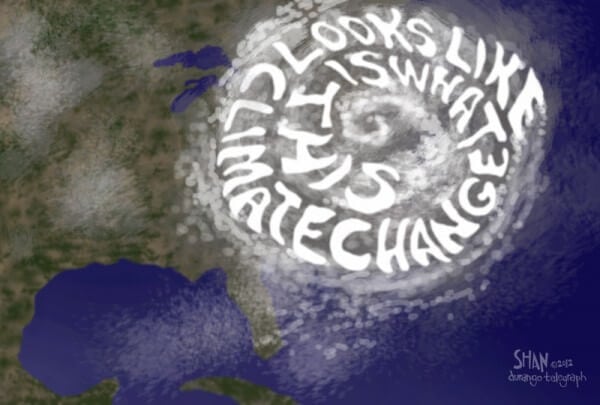The paper was peer-reviewed and appeared in the Philosophical Transactions of the Royal Society A, as part of a special issue based on an earlier workshop. The damage that analyzes is comprehensive, inclusive of wind, flood, sea level rise and other factors that might increase losses in the future.
Here is the abstract:
This paper examines future economic damages from tropical cyclones under a range of assumptions about societal change, climate change and the relationship of climate change to damage in 2050. It finds in all cases that efforts to reduce vulnerability to losses, often called climate adaptation, have far greater potential effectiveness to reduce damage related to tropical cyclones than efforts to modulate the behaviour of storms through greenhouse gas emissions reduction policies, typically called climate mitigation and achieved through energy policies. The paper urges caution in using economic losses of tropical cyclones as justification for action on energy policies when far more potentially effective options are available.And here is the conclusion:
This paper finds that under a wide range of assumptions about future growth in wealth and population, and about the effects of human-caused climate change, in every case there is far greater potential to affect future losses by focusing attention on the societal conditions that generate vulnerability to losses. Efforts to modulate tropical cyclone intensities through climate stabilization policies have extremely limited potential to reduce future losses. This conclusion is robust across assumptions, even across unrealistic assumptions about the timing and magnitude of emissions reductions policies on tropical cyclone behaviour. The importance of the societal factors increases with the time horizon. This does not mean that climate stabilization policies do not make sense or that policy makers should ignore influences of human-caused climate change on tropical cyclone behaviour. It does mean that efforts to justify emissions reductions based on future tropical cyclone damages are misleading at best, given that available alternatives have far greater potential to achieve reductions in damage. The most effective policies in the face of tropical cyclones have been and will continue to be adaptive in nature, and thus should play a prominent role in any comprehensive approach to climate policy.A literature review by Laurens Bouwer of the Institute for Environmental Studies published in Risk Analysis just a few months ago not only came to substantially similar conclusions looking out to 2040. Interestingly, he also found that the sensitivity analysis that I conducted included the largest climate change effects on tropical cyclones of any published study (which makes sense as my analysis was a sensitivity analysis, and did not offer projections).
Bouwer concluded:
Climate policy through the abatement of greenhouse gas emissions is important, given the likelihood that continued warming of the planet could lead to other (sometimes irreversible) impacts in second half of the 21st century. Mitigation policy therefore seems warranted for avoiding impacts beyond 2050. Also, changes in the frequency of other, smaller scale weather extremes, notably droughts, heat waves, wildfires, and extreme rainfall, although they have not been specifically assessed here, can occur. But changes in risk from major weather hazards (storms and floods) in the short term, up to the middle of the 21st century, are likely to be dominated by changes in exposure and vulnerability. This indicates the very important role for adaptation and risk reduction in strategies for reducing the impacts from weather natural hazards that are expected to occur in the short term.In short, arguments that climate mitigation policies are a useful tool for addressing disasters have essentially no basis in the scientific literature. This is not an argument against mitigation. It is an argument against justifying mitigation by the notion that disaster losses can be usefully modulated by energy policy.
Papers cited:
Bouwer, L.M. 2012. Projections of future extreme weather losses under changes in climate and exposure. Risk Analysis, DOI: 10.1111/j.1539-6924.2012.01880.x
Pielke Jr R. A. 2007. Future economic damage from tropical cyclones: Sensitivities to societal and climate changes. Philosophical Transactions of the Royal Society A, 365:2717–2729. (PDF)
